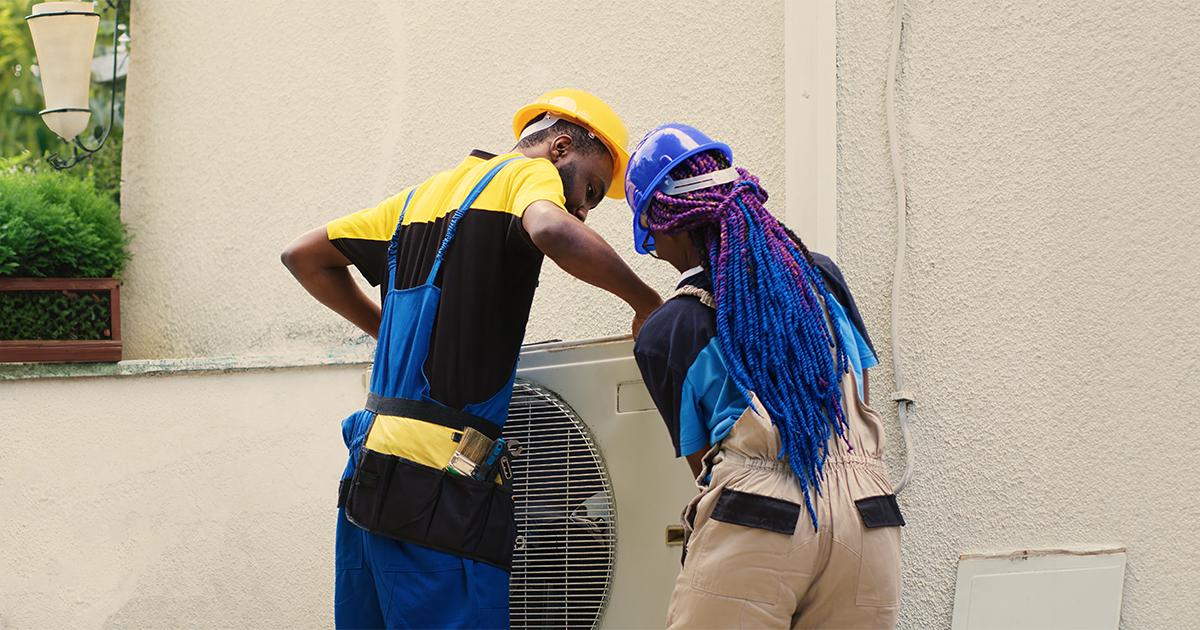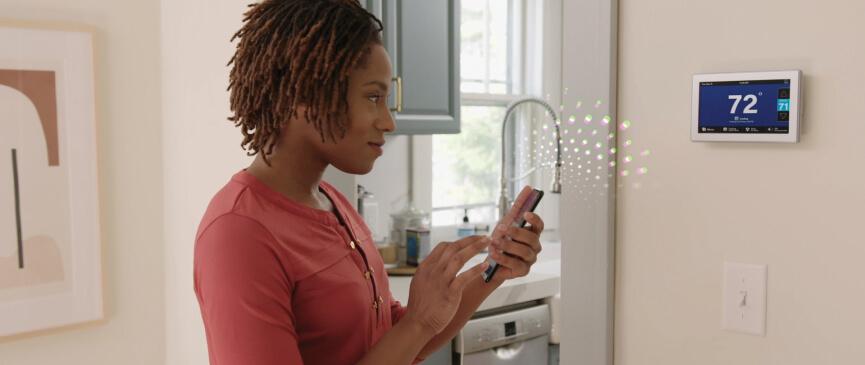Do I Need to Replace My Heat Pump?
Summary: Just like your car or home appliances eventually wear out, so does your electric heat pump. Learn about the warning signs and why replacing the air handler or furnace at the same time may be your best course of action..

By Anne Fonda
Replacing a heat pump is a big decision. Maybe a simple heat pump repair will suffice. But how do you make that decision? Our Repair or Replace Guide has some tips, but you wouldn’t be reading this article if you didn’t have a feeling that it’s time to replace your heat pump.
We’ll go over several aspects of a heat pump replacement to help you make the best choice for your home, including:
Here we go.
Top 4 signs it’s time to replace your heat pump
We’re focused on air source heat pumps that are part of a split system, but many of these signs apply to a ductless heat pump or mini-split heat pump system, as well.
1. More frequent and more costly repairs
An occasional HVAC repair - such as 0-2 in the last 3 years, is not a reason to replace your heat pump - unless it’s a very costly repair and your system is old. But if you’re on a first-name basis with your HVAC technician because you need heat pump repair of one kind or another every year or more than once a year, then it’s time to replace the unit. Put the money you’re spending on repairs into a newer, more efficient system.
2. It’s at or has surpassed its life expectancy
Should I replace my 20-year-old heat pump? Yes. Old age is another big indicator that it’s time to replace your heat pump. It’s better to replace an aging system while it’s still running than wait for it to fail completely during a heat wave or frigid temperatures.
The average life expectancy of a heat pump is 15 years. Poor installation and lack of maintenance can shorten the life expectancy, while a premium brand that’s well-maintained may last longer than 15 years.
3. Decreased comfort
An older, less efficient system struggles to heat and cool your home to your desired comfort level. If you’ve noticed it takes longer to get to a comfortable temperature or you need to set a lower temperature to lower the humidity, start planning to replace your heat pump.
4. High energy bills
If your utility bills are going up but your energy usage hasn’t changed and the utility rates haven’t changed, it may be time to replace your heat pump. While repairs may get your system running more efficiently, if the repair will be costly or if your system is old, replacing it may be a more cost-effective option.
If all 4 of the above are true for you, plan now for heat pump replacement before the system has a total breakdown.
Choosing the right heat pump replacement unit
As with any big purchase, it’s smart to do your homework to help you choose the right heat pump. The top considerations to consider, and discuss with local HVAC companies include:
Proper sizing for your home
This is the most important factor. Your HVAC system needs to be properly sized for your home. Just because you have an old 3-ton heat pump, that doesn’t mean you wouldn’t be better served with a 3.5-ton heat pump.
When you get quotes from HVAC companies, make sure they perform a Manual J load calculation. This takes a lot of factors into account, including the square footage of your home, the layout, the number of windows and doors, insulation, climate, and much more.
The result of the calculation will be a precise answer regarding what system heating and cooling capacity you need.
SEER2 and HSPF2 efficiency ratings
Electric heat pumps are one of the most efficient ways to heat and cool your home. Efficiency ratings are SEER2 (Seasonal Energy Efficiency Ratio), or cooling efficiency, and HSPF2 (Heating Seasonal Performance Factor), or heating efficiency. The higher the numbers, the more efficient the unit is. In general, high efficiency = lower energy consumption.
Heat pumps for cold climates
It's a myth that heat pumps don't work in cold climates. Some standard heat pumps may become less efficient at 32°F, but cold climate heat pumps can provide 100% of your heating needs down to 5°F or even below zero, depending on the unit you purchase. Work with your American Standard dealer to find the right heat pump for your climate.
Noise level
The noise level of a heat pump can be a factor if you live in an area where homes are close together or your heat pump is right next to your patio. We list the decibel ratings of our heat pumps on each product page. Our quietest heat pump is the AccuComfort™ Variable Speed Platinum 19 Low Profile Heat Pump.
Warranty
Before deciding which brand of heat pump to buy, look at the manufacturer’s warranties and ask about the installer’s warranty (if they offer one). Look to see how long the warranty lasts, what it covers, if it’s transferable if you sell your home, etc. A good warranty can save you money on HVAC repair bills over the years.
Heat pump replacement cost
The cost of heat pump replacement is a big consideration, but should not be the top consideration. With the increased energy efficiency of a new system, you are almost certain to have lower energy bills. This means you may want to opt for the most energy-efficient unit that you can get because you can save energy for years to come.
You can offset heat pump installation costs by choosing an energy-efficient unit that is eligible for federal tax credits, state rebates, utility rebates, and other offers. Check out the ENERGY STAR® Rebate Finder to see what’s available. You may be able to save thousands on a new system, depending on where you live and the median income in your area.
In addition, with HVAC financing through a participating American Standard dealer, you can make manageable monthly payments.
Heat pump tax credits and rebates
While the other factors have been all about compatibility, performance, and energy usage, now we get down to some of the financial aspects of why it’s important to replace the whole HVAC system rather than just the heat pump.
To be eligible for the heat pump energy tax credit and heat pump rebates provided by the federal and state governments, your eligible heat pump needs to be installed as part of a matched system. The federal tax credit is up to $2,000, and the state rebates (when available) may go up to $8,000 depending on your state and your income. And don’t forget the utility rebates. They require a matched system to be installed, as well.
Can I just replace the heat pump and not the air handler?
Theoretically, you could replace just the air source heat pump and not the air handler (or furnace). But we would advise against it in most cases. Why? Let’s take a look at some of the issues.
Compatibility
Your new heat pump likely won’t be compatible with an older air handler or furnace. This is especially true if your old system was improperly sized for your home. Technology and refrigerants have changed.
A communicating heat pump needs to be paired with a communicating air handler or furnace of the same brand. A variable-speed heat pump needs to be matched with a variable-speed air handler or furnace. In addition, a heat pump and air handler need to use the same refrigerant.
You need a matched system.
Performance and energy usage
Let’s say you go with a local HVAC company that says mixing and matching is fine. While a mismatched system may run, it won’t run at the peak efficiency and performance that the heat pump is supposed to provide. This can result in higher energy bills, costly repairs, and early system failure - potentially negating any cost savings you got from replacing only one component.
Warranty coverage
Finally, read the fine print. The warranty on a new heat pump may be voided if it is not installed as part of a matched system. Ask any HVAC contractor who tells you replacing just the heat pump is OK to see the warranty on the unit they are suggesting. A warranty can protect you, but you have to comply with the requirements.
The importance of heat pump maintenance
Whether you choose to go with heat pump repair in hopes of getting a few more years out of your system or opt for a new heat pump system, be sure to keep up with regular maintenance.
By changing the filters regularly and scheduling professional HVAC maintenance, you can keep your system running at peak performance.
How long should a heat pump last?
A maintained heat pump’s average lifespan is 15 years. Some higher-end units may last up to 20 years, depending on where you live. Failure to maintain your system may lead to early breakdown.
How often does a heat pump need to be replaced?
There is no set schedule for heat pump replacement. The specific health and age of the unit will help you make this decision when the time comes. But if you get a new heat pump system installed this year and take good care of it, you shouldn’t have to worry about replacing it for another 12-15 years, depending on where you live.
Talk to the heat pump experts
If you’re wondering if you should repair or replace your heat pump, get an expert opinion. Contact your local American Standard dealer for an honest assessment of your current heat pump system. Whether you’re in Atlanta, Shreveport, Charlotte, Louisville, or Chicago, we’ve got you covered.
They’ll tell you if repairs will keep your system going for another few years, or whether system replacement would be more cost-effective. They can also tell you how much more efficient a new system would be and what your potential cost savings might be. They’ll discuss the various American Standard heat pumps, air handlers, and furnaces to provide you with expert product recommendations tailored to your home.
If you do decide to opt for heat pump system replacement, get multiple quotes, and ensure the HVAC companies do a Manual J calculation to ensure correct system sizing. Correct sizing and expert installation will help ensure your comfort and the longevity of the system. An incorrectly sized unit will not keep you comfortable, and a poorly installed system will result in costly repair bills.
Anne Fonda
Content Writer, Trane Technologies
A Content Writer with Trane Technologies, Anne Fonda researches topics and writes for Trane® and associated residential HVAC brands. She works in collaboration with Trane Technologies subject matter experts, offering easy-to-understand, informative content on complex topics. Her goal is to help consumers make informed decisions on the products and services they need.
She has written for HVAC and other service provider websites for over 16 years. Before transitioning to web content writing, Anne had a 14-year stint as an award-winning journalist. She graduated cum laude from the University of Missouri-Columbia School of Journalism.
When she’s not working, Anne enjoys playing word games, reading, gardening, spending time with family, and visiting gardens and museums.
Expert review by Mark Woodruff, Senior Product Manager, Ducted Outdoor



